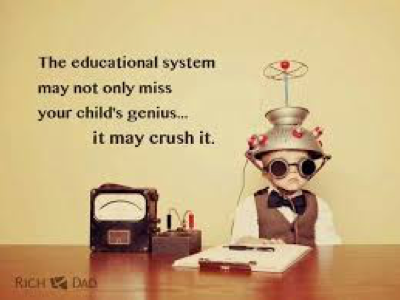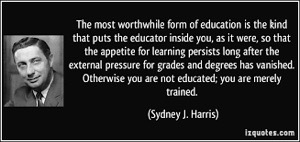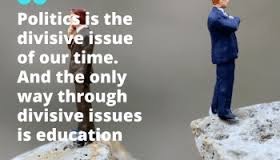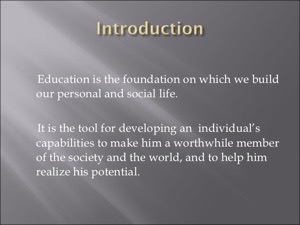
It has often struck me that, as a teacher, I was so often challenged to answer a variety of “What’s the point of this, then?” questions.
She who shall be obeyed (or else there are consequences I won’t enjoy) reports that in the region of 70% of her Year 7s have an attitude that takes the concept that education shall be free and morph this into education has no value,
The morphing process seems to be like this:
education shall be free
education has been charged at zero
education has been given no value
education has no value
education is worthless
education is useless
which results in wholesale destruction of any attempts to instil learning, even to the point where the minority who can see some point to having an education are unable to access teaching.
I have already written recently of the local effects in Greater Manchester and will attempt to do no further repetition. However, it does suggest that perhaps we do not challenge ourselves to answer the underlying question, the point of having education. I say that (probably) that those of us who have had an education cannot imagine being without one. It is, perhaps, only when you rub up against someone whose education is significantly different from your own, notably when significantly narrower or altogether smaller, that one recognises what one has.

I am well aware of a lot I do not know. I have no interest whatsoever in the life of the allegedly rich and famous; it is not any issue of mine that they are rich and they are not famous to me if I don’t myself know who they are. I am largely uninterested in whatever is currently passing for modern music. I have been in such a state for a long, long time; I make music and in a brass band we tend to play what has become ‘famous’ enough for someone to transcribe it for a band to play. That reveals to us as players how good or bad that music is. I aver that the Beatles and Queen wrote good music, by which I mean that it has sufficient complexity to maintain the interest of those not playing the melody.
Thanks to the internet, I can find answers to many questions. Again, we have difficulty establishing distinction between opinion and fact, and in detecting bias, but, provided I have curiosity, I can go find out some part of an answer.
If that is so, do I need any education? Beyond, say a minimum ability to read in a pump-priming sort of way? Well, that would surely depend what we think education is.
When I was at school, back when Pythagoras was a lad (according to Y8 since about 1995), we could not have been aware of the technical progress we would experience – computers the size of a house in 1960 were far less clever than a single chip in your phone and mean time between failures in the 60s was about the time it takes me to drink a coffee. So the stuff I was required to learn fifty years ago was soon out of date. I taught some GCSE chemistry in my last year of teaching and recognised some of the content as being not yet on degree courses while I was at university. Some of the physics we now teach at school covers principles had not been discovered then; much of the biology is explained in ways requiring techniques we had not yet managed to build.
Maths has hardly changed, though we have moved towards having a far more practical content, in the sense that far more of the stuff we cover at school is immediately applicable to ‘real life’. Or it is applicable, when teachers make effort to do so. I found, repeatedly, that my students were simultaneously happy that I’d found say, a use for trigonometry, but resented the implication that I thought they might become scaffolders (people who actually rely upon Pythagoras). I was accused as often of lowering their ambition as I was of doing careers work instead of teaching maths. The point they were missing was that the very jobs they were complaining about were what they thought of as low-status and using the maths they were otherwise so ready to reject. The majority of my A-level pupils have become engineers or doctors (and some may well be both). The medics as often thank me for insisting they learned some mechanics as they do for pushing a comprehension of statistics. Or, indeed for calculus and algebra.
What, you say, algebra is actually useful? Well, yes, say I (and you can’t help but think “Of course he would, he’s biased”). True, but I have seen the effect upon students of the before and after states. I suggest to you that a lot of the benefit of algebra is (learning to handle) the manipulation of symbols. While the use to which we put algebra is largely so we can do exercises in sciences, the effect is far wider. Take, for example, the ideas in lower school probability. Let’s say the probability of it raining today is 70%. Then it is surprising what we take from that. Some say it is a number and they ‘don’t do numbers’, but that they see that it will probably rain, i.e. more likely to than not. Some say that it means it will rain for 70% of today (not true, not what was said). Some recognise that there is about a 30% chance of staying dry if out all day. And so on; there is a spectrum of understanding. But the language of mathematics is exactly that; it equips you to deal with the sort of ideas that attach to numbers, by which I tend to mean ways we have for measuring or assessing the world.
Further than this, algebra leads you into logical paths. Here we come up against misunderstood concepts to do with sets and subsets and connections between them. The statement A=>B=>C does say that things which fit state A will also fit state C, but it is often used in spoken language to leave open whether absolutely all A belong in C – because we are rarely sufficiently precise. What has long bothered me is the reverse (and disastrous) misconception that if all A =>C then any C exhibits A. Not true: if A=>C is correctly stated then all elements of A do exhibit property C, but that does not mean that all things with property C have property A. That is a different relationship, A<=>C.
There is something we do similar when we confuse correlation with causation – Essay 232. There’s another topic about which I have often written: Banged on about: Bored the socks off people. Yet we continue to do it, so I do too. Worse, we allow others to do it and not only do we not challenge them, we fall for the rhetoric based upon such false premises.
So what is the point of education? In brief, it should be to equip you to cope with what it is that you do with your life. But that is not the same as you allowing a paucity of education to define the limits of that life; it is a forward action. We can’t know quite what that future life will be when you’re at school, so you need some general skills and general knowledge. However, it needs to be recognised that there is correlation between having more education and doing more with your life. This may even be causation, but only if your education stimulates you into wanting to explore. Thus education is not so much about the learning, but about the processes involved in making learning occur; more important still, it should be a very personal journey as you discover the several different ways in which you learn. Ideally, it sparks a long-term curiosity and a willingness to learn new things. So it is not what you know, but whether you know enough to go find out what it is that you don’t know. When you come across ‘stuff’, are you able to tell if this stuff has value to you? Is it reliable? Is that the same as trustable?
You may say, in response, that your education didn’t provide that. But then I suggest that the ways in which we measure education and the ways we measure ‘success’ of education are themselves flawed. I have always fought against ‘teaching to the exam’, except when the exam is, by proximity, the sole reason for having lessons. General teaching (exam off in the distance) is, in my head. always more about firing enthusiasm and persuading that this, today’s content, is either of interest for itself, or will lead us to understanding a targeted objective in the (hopefully near) future.
I was always very pleased that Y12 and Y8 would have adjacent lessons and each would ask what was on the board, “because it looks interesting”. To me, that is sufficient; curiosity.

My wife’s fight with the local kids over the point of learning Mandarin is lost with too many simply because they have closed minds. For those who bother to listen to her answer this is as much about opening minds to new concepts (e.g. the totally weird way they represent writing) and to new cultures (because this one is so very different it causes you to reevaluate your own culture). That is quite separate from the idea that being able to communicate might be a good idea. Which I separate from being able to attempt communication in another language, because I think that the attempt for the latter forces open your mind to the possibilities of the former.
I included a quote, in the essay two before this, “With the Internet, we can choose the very communities we want to be a part of.” Alex Shakar, The Savage Girl. I have written at length about the division of our society into subcultures and I agree that we find this comfortable, but, as in the essay on Bracken, this produces situations in which we surround ourselves with people who think the same way. There is a mob effect in which we all delude ourselves into common belief without questioning how it is that we reached such conclusions. This, I say, is not communication just as it is not thinking. We delude ourselves into thinking that both have occurred.
So, if study of a language allows us to question how our use of language infects and affects what we understand, perhaps we can use that same pattern of thought to establish what it is that we trust to be true? Similarly, if a study of history encourages us to learn to distinguish between primary and other sources, have we made significant progress toward recognising when we fall prey to forgetting to test a source? In a sense it is a pity we need so very many lessons to learn such things, but that suggests to me that we really are not good at learning about learning.
I suggest that our education is not achieving what it is that we intend it to. Some of us reach the intended target. As a nation we all benefit if the minimum education rises and if the median level rises, i.e. general, gross improvement without losing too many. What we are permitting is the formation of these sub-cultures without attempting sufficiently to dissolve the barriers thus formed. We fail in this to such an extent that I continue to fear the onset of a Dark Age.
To avoid this, we must each participate in enlightenment. First, yourself, then as many as you can reach. Just because state education is not sufficient does not make it a waste, nor does it mean that it is not your responsibility to yourself and others to do what you can to remedy the situation.
DJS 20170624

I note that I have done no research on this. That is to an extent because this is a rant based upon the previous essays and partly because I consider myself, in this case, justified in considering myself (being, on the basis of life experience) a primary source. That does not prevent me subsequently going to find if I can find others who agree. Right now is the ‘publish and be damned’ moment. I need a coffee.
Top pic? whatever I found on Google images I thought suitable at the time. Enough.
Please note that essay 203 applies, though it may at first look like a totally different subject.
Mere minutes after posting /publishing this, I find myself reading the Guardian Long Read and yet again we have a curious coincidence. This describes the ways in which our societies are divided by eduction (and its lack). Do read it. It goes on to explore elite anxiety about the consequences of political ignorance.